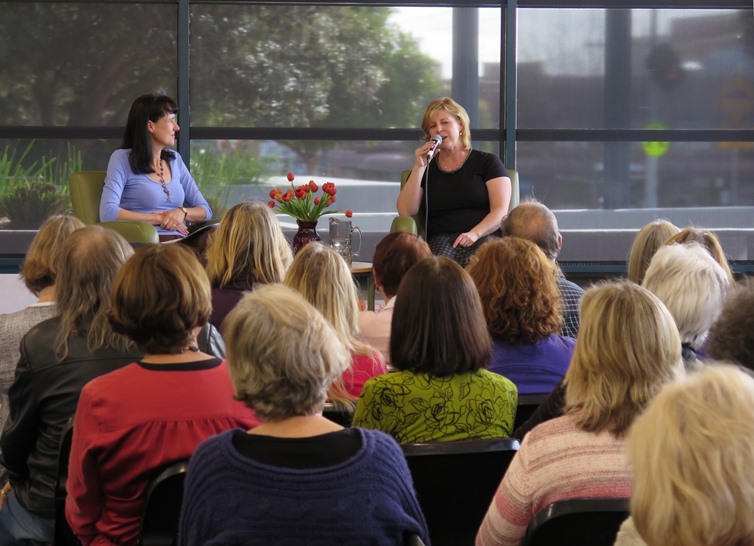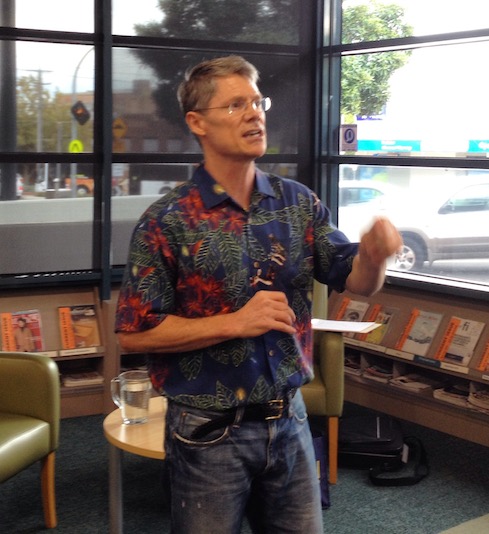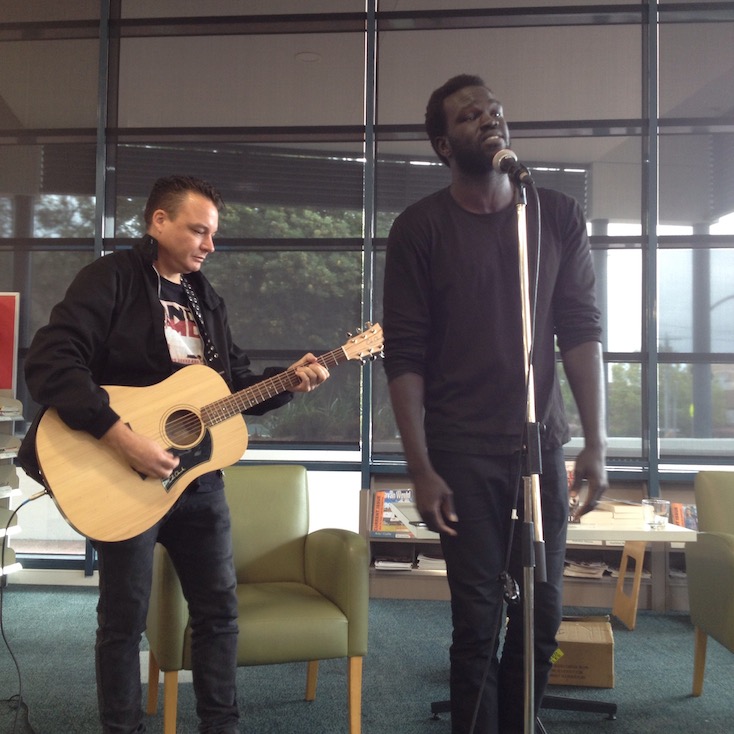Or … event planning at public libraries.
The Cause
Participatory learning is not a new concept, but becoming widely adopted as a valid way to engage with communities. Public libraries have used this approach in recent years to highlight their value and to support literacy development in our diverse local populations.
Libraries have great books and so much more, but there is a prevalent need to let people know this. One great method is to extend the power of the book by inviting authors to come along to provide further explanation, context, ideas, and personal story. This enriches the experience of the book for the library users and hopefully actively supports the IFLA credos about intellectual freedom, inclusion, fostering creative and critical thinking.

Kylie Ladd and Liane Moriarty at Frankston Library 2015 (photo by me)
The Sponsor
The sponsor is the governing organisation that provides the required funds to deliver these events, with a mandate towards social inclusion, public wellbeing, and community participation. The process can be upheld through regular checks and balances, reporting, and goodwill and integrity.
The Organiser
In this description, that would be me, and I have a process, a small team, venues, a budget, and no shortage of ideas. I am naturally organised and with project planning experience from my Industrial Design background, I love a good project plan. The main tool for my process is a spread-sheet in a multitude of variations. I can be juggling anywhere from 5 to 15 events and promotions simultaneously, all at varying stages in the process. I love a good Gantt chart but have simplified to a simple timeline. I prepare a communication plan for my team and other essential documents such as a media release.
The Speaker
Booked Out Agency serves as a perfect partner as a provider of authors as speakers. What a wonderful and empowering mechanism for authors to be able to extend their work! They are my first resource when I am planning to fill my events calendar.
Having found a speaker and agreed to the time, fees, etc. it is up to the speaker to engage with the audience.
Authors who are not well-known or just launching their first book can try to jump onto the speakers route through public libraries. This does require a bit of self-promotion and leg-work by the author to make the connection and pitch their worth to the library events organiser (me). Fees for speaking will be much less depending on what is expected and agreed. Sometimes free use of space in exchange for the speaking event can be a viable way for an unknown author to get into this field.
Once ‘on stage’ it is entirely up to the speaker/author to engage the audience. Not every speaker fully realises this opportunity provided to them. It is a special and unique platform to have the spotlight, to speak their truths, to say their piece. Some waste it. Some don’t inspire. Some are self-indulgent. Some are just inexperienced. Some can write eloquently but not be able to speak to an audience well at all. It is a performance to some degree. Expert speakers can talk underwater – for hours. Great speakers inspire, are humble, and authentic. Some just have one great idea that can hold an audience spellbound for an hour.
The Audience
People have to feel inspired into action to come along to a hear a speaker. Sometimes popularity or notoriety is all it takes to fill a space with eager attendees. They come with expectations, wanting to get ‘something’ from their investment of time and/or ticket price.
It is a serendipitous outcome. My attitude is based on the idea that whoever is in the room was meant to be there. Any particular mix of people will shape the event into the unique experience that it is. Any messages shared by the speaker or the attendees are expressed for all to hear and learn from.
The Results
This past year I have been successful in attracting people into the library who are not our regulars, or even library users. Does this translate into new memberships and more loans? Probably not. That is part of the aim but not in an overt or pushy manner. The hope is they will see the benefits and come back soon.
The results are dynamic, unique and engaging. Hopefully it reflects the objective: that we engage with the people in our community to inspire learning, support literacy development, encourage freedom of thought with the ability to think critically. We hope to instil this love of libraries into everyone of us.
Other Explanations
While researching the topic to see what others say about this ‘occupation’, I came across two descriptions that I particularly like:
#glamblogweekly


 We held one at the library where I work. I tried to create a cosy setting for the people that came along. And there was wine! The whole concept was appreciated and enjoyed with requests to do it again. #glamblogweekly
We held one at the library where I work. I tried to create a cosy setting for the people that came along. And there was wine! The whole concept was appreciated and enjoyed with requests to do it again. #glamblogweekly



